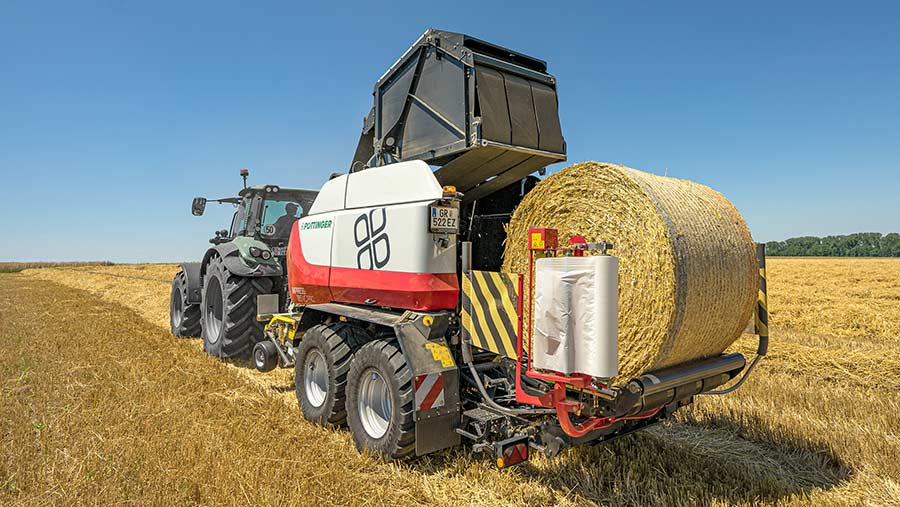Tech Talk: Experts’ verdict on Tractor Implement Management
 TIM technology promises to make light work of repetitive field operations such as baling © Pottinger
TIM technology promises to make light work of repetitive field operations such as baling © Pottinger It can be hard to sort the wheat from the chaff when it comes to agri-technology, especially when so many new inventions promise to revolutionise the way we farm.
In Tech Talk, our experts give an honest assessment of the technologies arriving on farm soon. What are their pros and cons, and should you bother with them?
Implements that control the tractor in front of them are seen as the next big thing in precision farming – offering big benefits to farmers and contractors.
What is it and what does it do?
Tractor Implement Management – or TIM for short – enables a farm implement to control the tractor pulling it, rather than the other way round. This means the implement can tell the tractor what to do, ensuring both machines are perfectly in sync and working optimally.
Does it really work?
Putting the implement in charge is more efficient than simply pulling it along. It means the whole operation is more productive, with the implement taking control of repetitive operations, adjusting the tractor’s forward speed to suit field conditions, saving fuel and reducing wear and tear on parts.
See also: Tech Talk: Experts’ verdict on the eyeSpot robot weeder
Get in touch
If you have a farm technology you want our experts to look at, or would like to be on our expert panel, email Johann Tasker.
What are the challenges getting it on to farm?
A mix-and-match approach is seen as essential. Security and getting different equipment brands to talk to each other has been a key hurdle. But advances in technology mean it can be done with the help of digital passports – similar to the technology used in online banking.
Which companies are bringing this to market?
The Agricultural Industry Electronics Foundation (AEF) – known for the development of Isobus standards which enable different machines to talk to each other – is a key facilitator. The big global machinery manufacturers are on board too.
When can I get one?
Fully fledged TIM technology is still in its infancy. Some companies are focusing on machines such as sprayers, while others are looking at balers. Machines with TIM capabilities are also expected to be on show at this autumn’s Agritechnica event in Germany.
What the experts say
Jamie Lockhart, Honingham Thorpe Farms
“The idea sounds great. I am all for it, as long as it does what it says on the tin. Too many times we get sold these systems and they add to the cost of the tractor or machine. We are promised the dream, but often the reality falls short. The concept of what they are trying to do is absolutely what we need, but the success rate in the past hasn’t always met expectations. If this new platform overcomes that, then great, but history shows it isn’t always that simple.”
Verdict: Must live up to the hype
Norbert Schlingmann, Agricultural Industry Electronics Foundation
“Tractors are essentially dumb machines – you can’t do anything with them unless they are attached to an implement. If that implement controls the tractor, rather than needing a driver, it opens up lots of possibilities. You can optimise the performance of both machines – as well as increasing driver comfort and reducing operator fatigue. Fieldwork is more efficient and you can also reduce fuel consumption and blockages – both of which are important, because they save time and money.”
Verdict: A range of benefits
Callum Chalmers, Farmscan AG
“An implement that can talk to the tractor really opens the door to better operating conditions. Giving the implement control over the tractor means it can make decisions specifically for the implement itself – whether it is forward speed or pto speed. It means you get longevity out of the machine, as well as less wear and, ultimately, higher productivity. Realistically, manufacturers need to lead the way, and as they do, you will see developments accelerate rapidly.”
Verdict: More efficiency and higher yields

